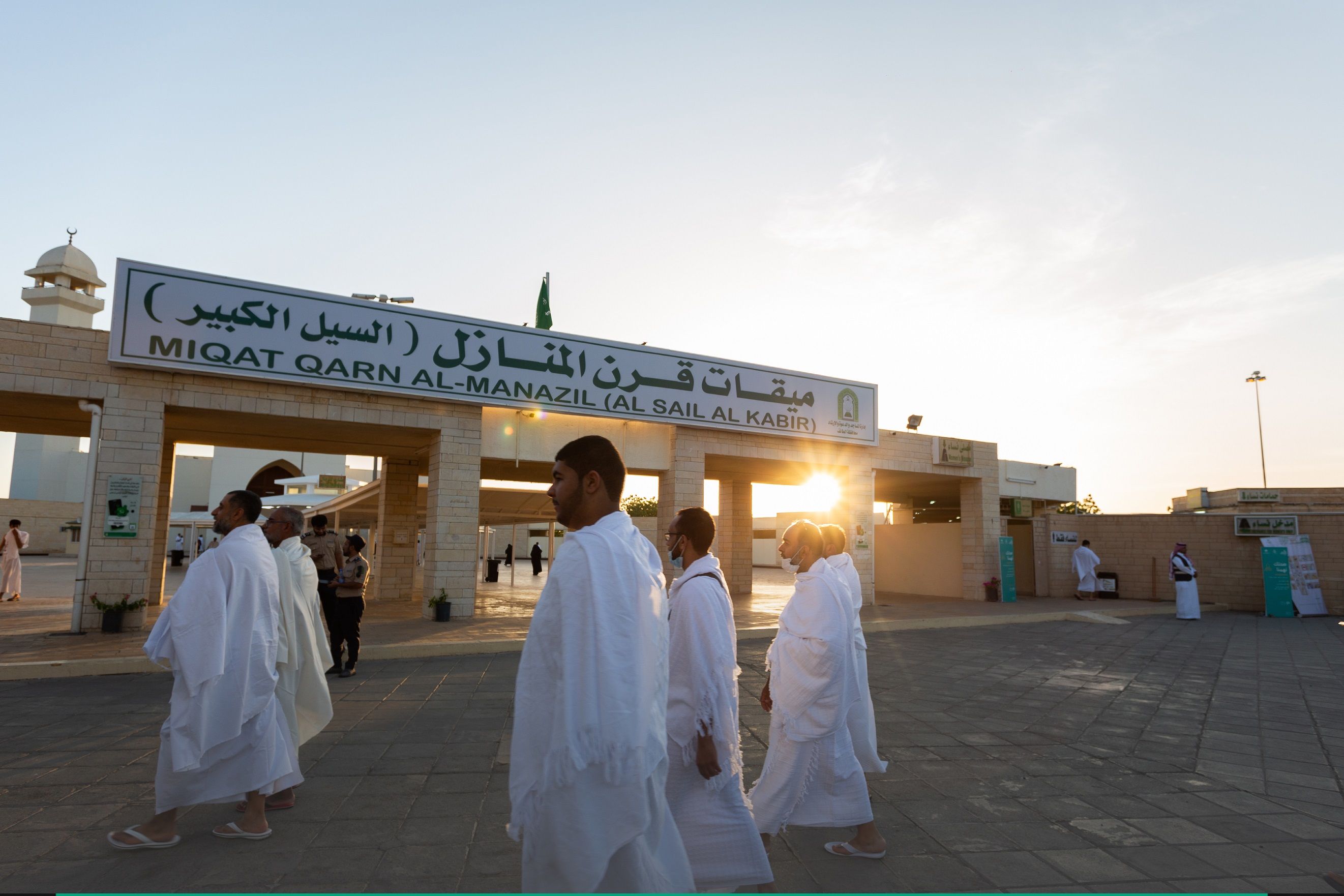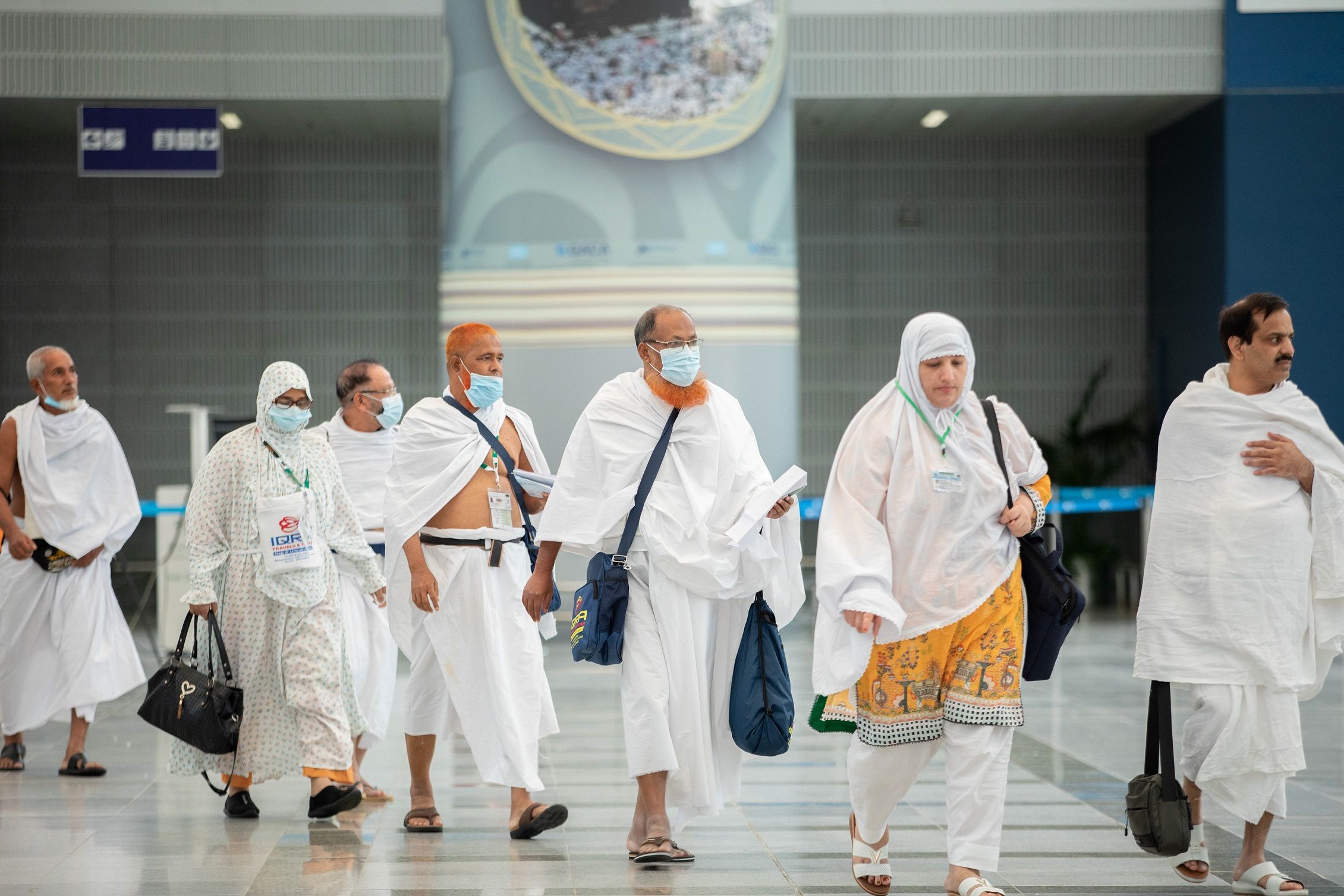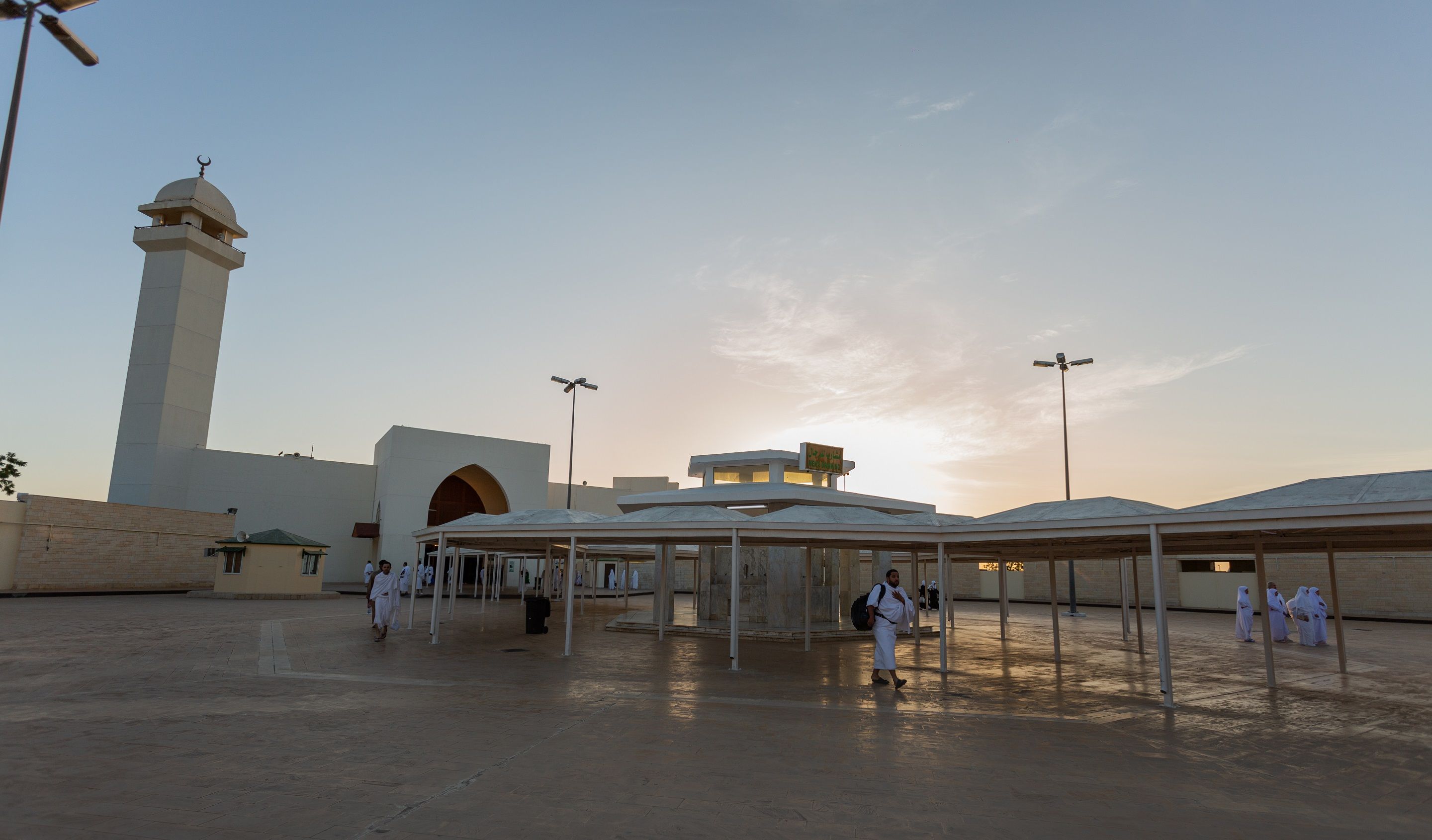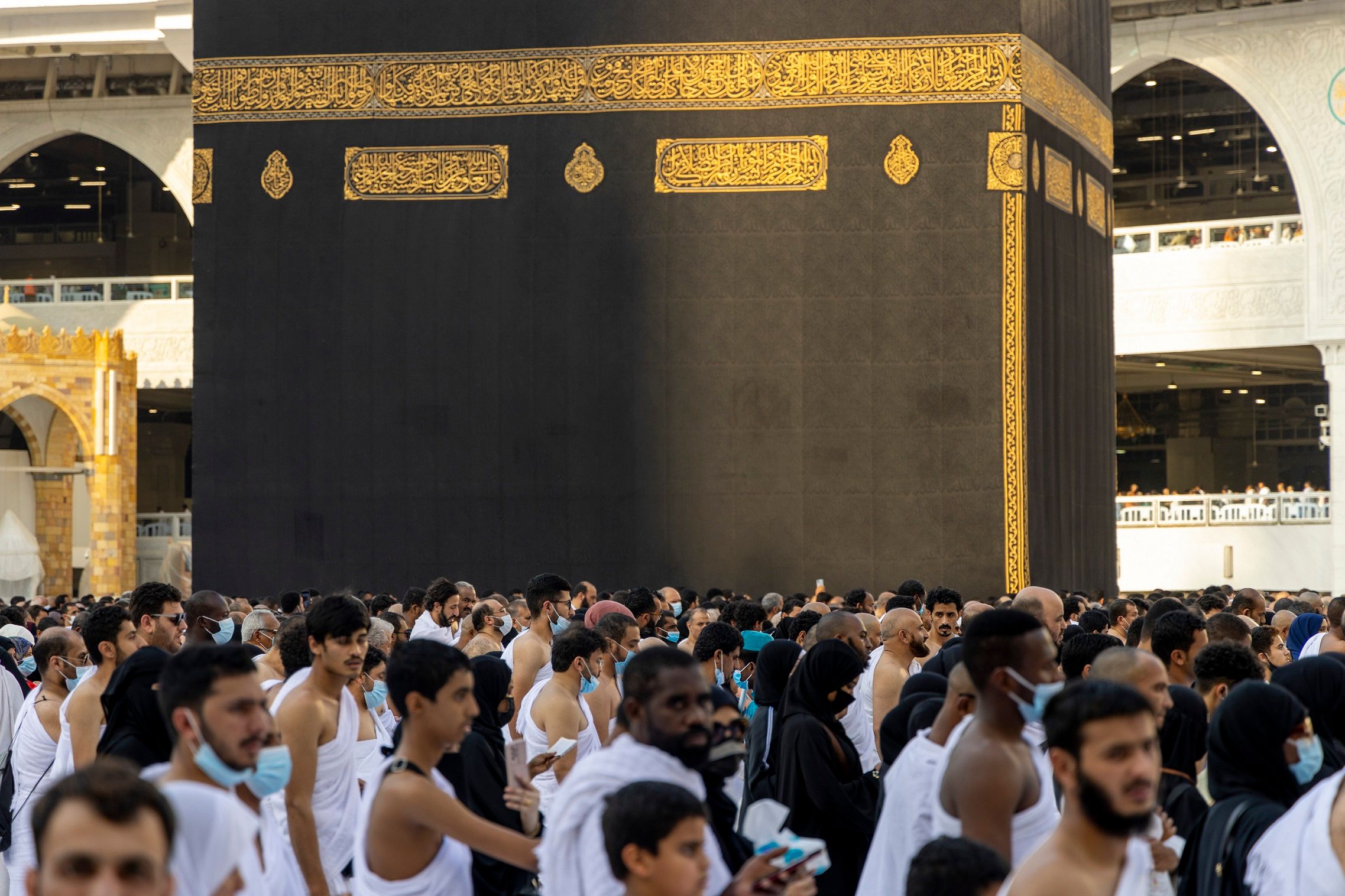Ihram is a great worship with which you start your Hajj or Umrah rituals
In Ihram, all people are equal in their dress and appearance. Color and material possessions do not matter at all. After entering the state of Ihram, they proceed to perform the rituals in humility to Allah and supplicating Him alone.
Ihram is the commencement of the rituals of Hajj or Umrah. The rituals are commenced by intending to start Umrah or Hajj and reciting Talbiyah. It is the first pillar of Hajj and Umrah.
A Hajj or Umrah pilgrim may stipulate upon initiating Ihram if he fears his inability to complete his rituals for any reason.
Ihram is the first step in your journey of faith and an act of the heart with which you engage in a great act of worship. Allah commanded us to make our intentions sincere and to perform the rituals for His sake, Glory be to Him, in the most perfect manner. The Almighty said: {Perform Hajj and Umrah for (the sake of) Allah}.
What is Ihram?
- Ihram is entering into the act of worship of Hajj or Umrah. It involves intending to enter into Umrah or Hajj and reciting Talbiyah, which is the first of the pillars of Hajj and Umrah.
- It is the first step in your journey of faith and an act of the heart with which you engage in a great act of worship. It is a great act of worship for which Allah commanded us to make our intentions sincere, and perform its rituals for His sake, Glory be to Him, in the most perfect manner. As the Almighty said: {Perform Hajj and Umrah for (the sake of) Allah}.
- With this intention, things that are permissible before entering into the state of Ihram are now forbidden: such as intercourse, shaving the head, clipping nails, covering the head, wearing sewn clothes for men, etc.
- If you want to engage in the worship of Umrah, you must refrain from the prohibitions of Ihram, and intend to engage in Umrah saying: "Labbayka Umrah". Then, you begin reciting Talbiyah. If you intend to start performing the Hajj rituals, you shall start with by saying: "Labbayka Hajjan". Then you begin reciting Talbiyah.
Stipulate a condition in Ihram
Islam is a religion of ease, as Allah Almighty said: {Allah intends for you ease and does not want to make things difficult for you}. One of the manifestations of this facilitation for Muslims in performing acts of worship is taking into account the circumstances that may prevent them from completing the rituals of Hajj or Umrah.
If a pilgrim fears that he will not be able to complete the rituals of Hajj or Umrah for any reason, it is lawful to stipulate a condition while in Ihram.
How to stipulate?
If the pilgrim performing Hajj or Umrah fears that he will not be able to complete his rituals due to a disease or a lawful excuse or for a reason beyond his control, it is allowed for him/her to make exceptions in their utterance of the intention. One does so by saying after saying "Labbayka Umrah" or "Labbayka Hajjan": "If I'm deterred for any reason, then my place is where You deterred me (this can be said in any language)". If a pilgrim says this and stipulates a condition, and then something prevents them from completing the ritual, it is permissible for him to leave the state of Ihram without falling under any further obligation.
Who can stipulate a condition?
Whoever fears that one will not complete the rituals for a reason beyond their control, including:
- A woman who is afraid that a legitimate excuse (i.e., the menstrual period) will prevent her from completing her rituals
- A sick person who fears that he will not be able to complete his rituals
Instructions for people in Ihram
You are now performing great worship that you have entered with your intention and Talbiyah. Here are a few important pieces of advice:
- Glorify Allah’s rituals, commands, and prohibitions. Give them their due reverence and respect. The Almighty says: and whoever honors the rites of Allah, indeed, it is from the piety of hearts.
- Avoid all acts that violate or desecrate your Ihram, such as quarrels, raising your voice, and hurting or arguing with others. The Almighty says: Whoever intends to perform Hajj therein, then they should not have sexual relations with their spouse, nor commit sin, nor dispute during Hajj.
- Recite Talbiyah as much as you can, for it is a great remembrance and supplication that is not prescribed except in these times. The Prophet, blessing and peace be upon him, said: “No Muslim recites Talbiyah except that whatever to his right and left but reiterate it: rocks, trees, and hills, to the farthest ends of the earth in each direction, from here and from there.
- Abide by the instructions of the security personnel and mission supervisors, for they are keen to ensure your and other pilgrims' interests.
- Learn the rules of Hajj and/or Umrah.
- Avoid exposure to direct sunlight and use a sunshade when you go out during the daytime.
Examples of things that may prevent you from performing your Hajj or Umrah rituals
- Illness
- Menstruation
- Emergencies

Entering Ihram state on plane
- Everyone coming to Makkah for Hajj or Umrah must enter into the state of Ihram from the Miqat specified for them.
- Those traveling by plane to Jeddah shall enter into the state of Ihram on the plane when one is in line with the Miqat.
- On a plane, the alignment with the Miqat is usually announced well prior to reaching it, and then there will be an announcement again when the plane is actually aligned with the Miqat.
- A person who wants to perform Umrah must prepare his Ihram clothes and remove what is forbidden to him while in Ihram well before the announcement of the plane's alignment to a Miqat, so as to avoid crowding at the toilets on airplanes.
- When the actual alignment with the Miqat is announced, he implies the intention of Hajj or Umrah. Then, he utters what he intended, saying: "Labbayka Hajjan" or "Labbayka Umrah" and then begins reciting Talbiyah.
- He has to be alert and stay awake in order to intend to enter into Ihram over the Miqat. If he fears that he may fall asleep, then he can enter into Ihram before reaching the Miqat.
- If he suspects or has been informed that the flight crew will not alert them to the alignment with the Miqat, he can enter into Ihram before arrival as a precaution, e.g., half an hour before the arrival time.
If the flight crew announces alignment with the Miqat, you should intend to enter into Ihram for Hajj or Umrah and vocally utter the type of ritual you intended to perform. "Allaahumma Labbayka Hajjan" or "Allaahumma Labbayka Umratan".
As a precaution, you may enter into the state of Ihram onboard before aligning with the Miqat
- If you fear that you will fall asleep or forget
- If you suspect that the flight crew will not announce alignment with the Miqat

Talbiyah
Talbiyah is the reiteration of "Labbayk Allaahumma Labbayk, Labbayka Laa Shareeka Laka Labbayk. Innal Hamda Wan-ni'matah Laka Wal-Mulk, Laa Shareeka Lak (Here I am at your service, o Allah, at Your service! At Your service! You have no partner! I am at Your service! Indeed, all praise and grace belong to You, and so does the supreme authority. You have no partner".
With this, the Muslim declares at the beginning of his Hajj and Umrah that he has come in response to and in compliance with the command of Allah Almighty to perform that ritual. Although this is the custom of a Muslim in all his deeds of worship, in Hajj and Umrah he announces and repeats it in order to get himself used to these great meanings.
What is the meaning of the words of Talbiyah?
Its meaning is: O Allah, we have come, answering Your call to perform Hajj time after time, acknowledging You in monotheism and worship, and acknowledging Your grace and the perfection of Your supreme authority.
Talbiyah is the majestic motto of the pilgrims. It declares servitude and obedience to the Creator and the Bountiful Giver. Glory be to Him.
Whispering and Saying loudly Talbiyah:
- For men, it is Sunnah to raise their voices when reciting Talbiyah. The Prophet (blessing and peace be upon him) said: 'Jibreel came to me and ordered me to order my Companions to raise their voices when reciting Talbiyah.
- It is prescribed for women to lower their voices when reciting Talbiyah.
When does Talbiyah begin? When does it end?
Starting Talbiyah
The time for Talbiyah begins the moment of initiating Ihram. A Hajj or Umrah pilgrim entering into Ihram shall do the following:
- He shall intend performing Hajj, Umrah, or both.
- He shall say: "Labbaik Hajjan", "Labbaik Umrah", or "Labbaik Hajjan Wa-Umrah". By uttering these words, one enters the state of Ihram.
- He shall repeat the following Talbiyah loudly: "Labbayk Allaahumma Labbayk, Labbayka Laa Shareeka Laka Labbayk. Innal Hamda Wan-ni'Matah Laka Wal-Mulk, La Shareeka Lak. Here I am at your service, O Allah, at Your service! At Your service! You have no partner! I am at Your service! Indeed, all praise and grace belong to You, and so does the supreme authority. You have no partner".
Concluding Talbiyah
- In Umrah, Talbiyah ends when you see the House or begin Tawaf
- In Hajj, Talbiyah ends when you stone Jamrat Al Aqabah

Prevention of intertrigo and rush in body folds after Ihram
The problem of intertrigo and body fold rush is common among pilgrims performing Hajj and Umrah, especially among people with obesity and diabetes. The skin becomes infected due to friction and lack of underwear. Rush occurs in folds where two layers of the skin meet, such as:
- The groins
- Armpits
- Under the breasts
This is sometimes accompanied by painful itching.
Prevention
- Take care of your personal hygiene
- Keep body folds such as thighs and armpits well ventilated
- Apply ointments on the body before walking
- When infected, wash the area well before applying medications such as healing ointments
Precautions
- Wearing clean clothes will prevent many health problems such as irritating skin abrasions
- Diabetics should be aware that peeling of the skin may increase due to crowding, excessive sweating, and abnormal blood sugar levels

Determining your Miqats
Why are there special sites (Miqats) for entering into Ihram?
Out of respect for the Honored House of Allah and the rituals of Hajj and Umrah, the Messenger of Allah (blessings and peace be upon him) specified places before reaching Makkah, where pilgrims enter into the state of Ihram, and from which they begin reciting their Talbiyah before reaching the Haram.
After specifying the exact locations of these places, the Prophet (blessings and peace be upon him) said: "These Miqats are for the people at those very places and those who come through those places with the intention of performing Hajj and Umrah".
These sites differ in their distance from and proximity to the Grand Mosque, depending on which direction you come from.
Pilgrims who live beyond those Miqats are obliged to enter into Ihram at the Miqats or any adjacent or parallel points on the way, whether they travel by air or by land. They should not go beyond them without entering the state of Ihram.
Determining your Miqats
The reason why Miqats are prescribed is to venerate the Grand Mosque of Makkah. Miqats depend on the whereabouts of the person who intends to perform Hajj or Umrah; i.e., whether they are in Makkah, somewhere between Makkah and the Miqat, or beyond the Miqat. All of that would be explained as follows:
Determining your Miqats
Those who are in Makkah:
- They enter into the state of Ihram for Umrah from the nearest place outside the Haram, such as Masjid Aisha in Al Taneem. As for Hajj, pilgrims shall enter into the state of Ihram from the very place they are in.
Those somewhere between Makkah and the Miqats:
- They enter into the state of Ihram for Hajj or Umrah from the very place they are in, like in the case of someone living in Jeddah or Bahrah.
Those beyond the Miqats:
- They shall enter into the state of Ihram for Hajj or Umrah from one of the five Miqats or from a parallel point.
A pilgrim or a visitor living far from Makkah is obliged to enter the state of Ihram at one of these five Miqats or a parallel point on their way regardless of the travel means, by a plane or by a vehicle. They may not go beyond the Miqat without entering the state of Ihram.
Miqats for Ihram
Miqats are the places from which a pilgrim who wants to perform Hajj or Umrah enters into Ihram. A pilgrim seeking to perform Hajj or Umrah must not pass from one of these Miqats without entering the state of ihram. They are:
- Dhul-Hulaifa: the Miqat for the people of Madina. It is 420 km from Makkah.
- Al-Juhfah: the Miqat for the people of the Levant and those on their way. It is 187 km from Makkah. Today, people enter Ihram in Rabigh, which is 204 km from Makkah.
- Qarn Al-Manazil: the Miqat for the people of Najd and those on their way. It is 94 km away from Makkah.
- Yalamlam: the Miqat for the people of Yemen and those on their way. It is 115 km away from Makkah.
- Dhat Irq: the Miqat for the people of Iraq and those on their way. It is 92 km away from Makkah.

Pre-Ihram prophetic ways
Several acts are prescribed before intending to enter into the state of Ihram:
Taking a full bath (Ghusl) or performing the ablution (Wudoo).
- It is prescribed to take a full bath (Ghusl) or perform ablution (Wudoo) before the pilgrim intends to enter into Ihram. This is a Sunnah for males and females, in all circumstances; yet, it is not an obligatory Ghusl. If someone cannot take a bath, they can perform a normal ablution (Wudoo) instead.
Taking a bath at home
- A person who cannot perform a full body wash (Ghusl) at the miqat, like a person on a plane, can perform a full body wash for Ihram at home before going to the airport. If the plane is parallel to the miqat.
- Being in a state of ritual purity is not an obligatory condition for valid Ihram, but is recommended.
- Personal hygiene, such as clipping nails and removing armpit hair and the like, is permissible in all cases, especially before entering into the state of Ihram because it is forbidden to remove them while in Ihram.
Entering into Ihram after performing a prayer
- It is prescribed for a person in Ihram to enter Ihram after a prayer. If it is time to perform obligatory prayers, one needs to pray first and then intend Ihram. If this is not the case, it is right to perform ablution and pray two Rakaah, after which the pilgrim enters into Ihram and recites Talbiyah.
The Prophet (blessings and peace be upon him) said: "A messenger from my Lord visited me while I was in the Aqiq (valley)", and said to me, "Offer prayer in this blessed valley and say: (performance of) Umrah and Hajj together".

What is Ihram clothing for men
Hajj and Umrah are unique moments during which pilgrims give up their prestige and money. All people are equal in their dress and appearance. They are not separated by color or material possessions. They gather on the same spots, praying to Allah and supplicating to Him, for Glory be to Him, the Rich and all His servants stand in need for Him.
What should a person wear to enter into Ihram?
A pilgrim must take off his usual clothes, including:
- Head coverings, such as hats, turbans, etc.
- The usual, sewn clothing, such as shirts, pants, socks, gloves, etc.
- Shoes around the entire foot and ankles
- He wears a cloth that surrounds the lower part of his body, and another for the upper part
- It should be white
- He shall wear appropriate sandals that do not cover the entire foot
The following items may be worn be during Ihram:
- A buckle or belt that he wraps around his waist to keep his Izaar (waist-wrapper or lower garment) from falling, and in which he can put his belongings, phone, and money
- Watches and rings
- Plasters and bandages to cover wounds
- Umbrellas and all head coverings that do not touch the head
How to wear the Ihram?
A man’s Ihram consists of a waistcloth that covers the lower part of his body and another cloth that covers the top of the body. In some Muslim regions, people are accustomed to wearing these in an appropriate way because it is their traditional dresses. On the other hand, some people find it very difficult to wear the Ihram in an appropriate manner that ensures it is:
- Sufficiently covering the body
- Comfortable convenient to walk freely
- It is fixed firmly and does not hang or fall

What do women wear in Ihram
Hajj and Umrah are two of the best acts of worship for both men and women. The Prophet (blessings and peace be upon him) said: "You (women) should engage in a jihad in which there is no fighting; Hajj and Umrah".
When entering into Ihram, a woman can choose what she wants to wear. She can enter into the state of Ihram in whatever color of clothes she likes provided that they are
- Loose, and cover the body without impeding movement
- Free from apparent adornments that may tempt men
Prohibitions of Ihram for Women
A woman in Ihram is forbidden from the following:
- Covering the face and wearing the Niqab, yet, if she is in the presence of non-Mahram men, she may cover the face
- Wearing gloves
The following are not prohibited during Ihram
- Wearing glasses, rings, and watches
- Plasters and bandages to cover wounds
- Covering a woman's face when she fears temptation
Note
Women should choose loose, wide and covering clothing that is breathable, especially during summer hot days.

Prohibitions of Ihram
In essence, these are permissible but are restricted in Ihram as part of worship, so that people show their need for their Creator and Master.
Some of these prohibitions apply to both men and women, some apply to each separately.
General Ihram prohibitions for men and women
- Sexual intercourse: it is forbidden for both men and women
- Concluding a marriage contract
- Killing game
- Shaving the head or clipping nails
- Wearing perfume
Men-only Prohibitions
- Covering the head with something directly touching the head such as a hat or a turban
- Wearing the usual sewn clothes, such as shirts, pants, underwear, socks, gloves and shoes around the entire foot up to the ankles
Women-only Prohibitions
- Covering the face and wearing the niqab. However, a woman fearing sedition in the presence of non-mahram men may cover her face
- Wearing gloves
Things permitted while in Ihram
- Having a bath
- Wearing glasses, rings and watches
- Dressing wounds with plasters or bandages
- Wearing a belt and wallet around the body
- Carrying an umbrella to protect yourself against the sun or rain
- Wearing open shoes
- Women covering their face when they fear temptation

